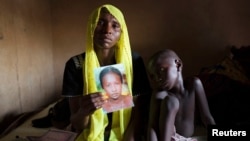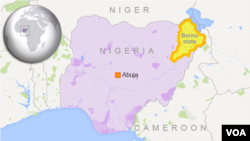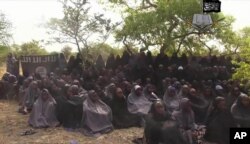The Nigerian government said earlier this month that it is in regionally mediated talks with Boko Haram to negotiate the release of 219 missing schoolgirls taken from their dormitories in April. However, the Chibok girls were not an isolated incident. In the past week alone, local media have reported two separate incidents in the northeast in which dozens of women and girls were grabbed. Human Rights Watch says in a report released Monday that Boko Haram has taken at least 500 women and girls, most of them in the past year and a half.
Teenage girls and young women are disappearing in northeastern Nigeria.
Human Rights Watch said Boko Haram began abducting them in earnest around April 2013 - after more than a year of threatening to do so. The kidnappings escalated as Boko Haram seized towns and territories, in particular in southern Borno state.
Human Rights Watch said Nigerian authorities have done little to address, or even acknowledge, the mounting threat.
HRW researcher Mausi Según said militants were taking women and girls from the roads, from the fields and even from their houses.
“They’ve realized that they can do it and no one is stopping them and they continue to do it,” said Según .
Boko Haram has expressed two primary motivations for grabbing women and girls. One, retaliation for militants’ wives and children they say are detained by the government and two, the sect’s stated aim to push Western education out of the north and keep girls out of school.
HRW has documented 500 individual abductions but Según believed that number was “conservative.” Cultural taboos and threats from the militants mean victims and their families are hesitant to speak out.
Según interviewed 30 women and girls who escaped or were released, including a dozen of the 57 Chibok girls who got away in the early hours and days after that mass abduction.
She said many kidnappings appeared to have been “opportunistic” and that included Chibok, the sect’s largest grab to date, a total of 276 girls.
The militants rolled into Chibok on motorbikes and small cars that night. They wanted to cart off the secondary school’s brick making machine and food stocks.
“They repeatedly asked for that machine and threatened to kill some of the girls...you all must show us or else we’ll start the shooting,” said the researcher.
The school’s administrative staff members were not there. The civilian guard ran off. The girls were alone.
“After realizing that there was absolutely no one else within that school compound…It was opportunistic. They decided they could take them [the girls] and they took them,” said Según .
They sent two men into town to get a truck. “They packed all the food into the store and told the girls fit yourself into that truck if you want to live,” she said.
The girls scrambled. Those who couldn’t fit had to walk the 10 miles at gunpoint, with militants commandeering more vehicles along the way and shoving them in.
It was improvised, Según said, and the fact that they pulled it off with no resistance only “emboldened them” to take more.
Según said they targeted Christian women whom they forced to convert. Some are released, sometimes with money and gifts, on orders that they go convert their husbands or else.
Según said one Christian woman tried to defend her faith. “A noose was tied around her neck and the leader dragged her on the ground. They whipped her severely and told her she was a pagan,” she said.
In footage HRW released to the media, other young women described being told they must marry combatants. One woman described being raped.
Another teenage girl said she had to carry bullets during operations.
She said they told her to kill a man but she couldn’t. Instead she considered grabbing a gun from the insurgents and killing herself.
(Courtesy: Human Rights Watch)
Según said the families of the missing got little support. One family went to the police when their daughter returned.
“They were told, you should thank God that your child has escaped. Just go take care of her and that was it. Not one of the women or girls that we saw, outside of the Chibok incident were ever documented or interviewed by security forces or law enforcement,” she said.
Según said the women and girls returned traumatized and fearful. Their churches and families paid for the medical treatment they needed. Según said the women she met aren’t getting counseling. Many have been displaced by continued fighting in the northeast.
Boko Haram has been ruthlessly targeting civilians. The rise in abductions has coincided with this broader intensification of abuses. HRW says since May 2013, Boko Haram attacks have killed more than 4,000 civilians, at least 2000 people in the first half of this year alone.






